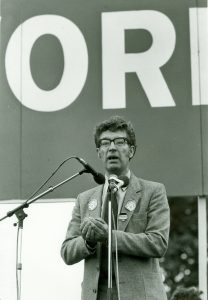
An interesting footnote to this section suggests itself from the 1968 Report by the Executive Council to National Conference. The announcement is recorded that Sydney Hill is retiring and that Alan Fisher would be replacing him. Two or three paragraphs later, on the same page, it is noted that six new Area Officers have been appointed. Among them one Rodney Bickerstaffe. Three General Secretaries on the same page except, of course, Conference paid little attention to the new Area Officer.
The retirement of Alan Fisher was announced at the 1981 National Conference and the process of replacing him began.
Six candidates were interviewed by the Executive Council in July 1981 with Ron Keating, then Assistant General Secretary (Negotiations) the perceived favourite to succeed Alan Fisher.
Rodney’s archive demonstrates the careful preparation he undertook for all the posts he applied for. There is an 18 page handwritten document showing the detail of this preparation for the General Secretary post. He produced a series of questions he expected to be asked. He then got a friend of his to grill him on the questions with the “interview” recorded on tape. he asked his wife, Pat, to transcribe it onto paper so he could re-read it more than once before the interview. Thankfully, Pat’s handwriting is much more legible than his and it makes interesting reading.
In the event, the Executive Council decided to ‘jump a generation’ and, with a large majority, appointed the 36 year old National Officer to the post of General Secretary. It was a rapid rise from Trainee Officer to General Secretary in just 15 years.
Tom Sawyer, who had been his deputy in the Northern Division, was later appointed Deputy General Secretary. Presumably, the Executive Council saw the successful Northern Team as a benefit nationally.
To appoint Rodney, barely five years after arriving at Head Office, and with just over a year as a Divisional Officer, was a brave decision. Having three of his fellow candidates for the job in his senior officer team and being relatively young could have had a negative impact on the union. However, Rodney’s personality, skills and commitment to the interests of the membership above all else ensured everyone focussed on building a hugely successful union with influence at every level of the labour movement.
He took over the leadership at a challenging time. Jim Callaghan had dithered over the calling of a General Election towards the end of 1978 followed by the so called “winter of discontent”. The election, when it was held in 1979, led to the right wing government of Margaret Thatcher producing huge challenges to the leadership and members of the union over the next decade and more.
Much was made of the 1979 dispute by the media and the government, with photographs in the press showing piles of rubbish and claims that burials were not taking place. A government minister challenged Rodney asking him if he had no concern for the dignity of the dead. Rodney’s characteristic response was “my concern is for the dignity of the living”.
That concern was demonstrated frequently thereafter in his approach to policy development and campaigns.
Biography by Jim Sutherland
Next > General Secretary in Action I Biography index
